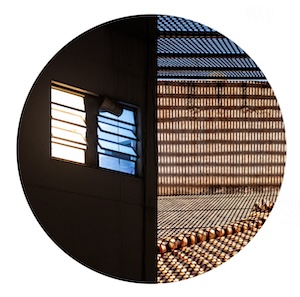Such tricks
hath strong imagination,
That if it would but apprehend some joy,
It comprehends some bringer of that joy…
—William Shakespeare
A week of intense heat, clear sky. I stand
making rainbows in the garden just as
sunlight begins chopping apart shadows
into the outlines of roofs, and my shed.
I keep my promises to what I plant.
Starting at chest-height, swinging down, a scythe
of color sweeps through the coreopsis
without hurting them. Around my shoulders,
fine mist loads the air with translucent flies
that float upward, and fall, landing on wild
flowers, milkweed, the raspberries. My feet
are getting soaked. The light, that we think is
of all things complete, shatters in a bead
of water. Not uniform, in fact, light
is like us—varied, composed of different
parts, each almost distinct. What if today
one of the archaic gods came to me,
resilient, serene—simultaneously
like a root pulled damp from the soil, and like
a raptor, gliding cloud-ward on thermal
updrafts—a being with saucer-sized eyes,
like the clay idols of Minoan Crete?
Would I recognize this Demeter, proud
of the stretch marks on her belly, and know
she spilled out of me, an effigy of joy?
Or would I pretend, like the ceramicist
with hands reddened by terra cotta,
that I am not inventing the image
for a formless thing I’m compelled to give
a face? “Let me see my happiness,” he
said. “Only then will I believe in it.”
Around his shop, there were heaps of broken
pottery for grog, icons that did not
survive the kilning. There were newly fired
amphorae, and jars, meant for preserving
olives, and wine. As he applied bright paint
to a god, he hummed. He gave it a name.
That if it would but apprehend some joy,
It comprehends some bringer of that joy…
—William Shakespeare
A week of intense heat, clear sky. I stand
making rainbows in the garden just as
sunlight begins chopping apart shadows
into the outlines of roofs, and my shed.
I keep my promises to what I plant.
Starting at chest-height, swinging down, a scythe
of color sweeps through the coreopsis
without hurting them. Around my shoulders,
fine mist loads the air with translucent flies
that float upward, and fall, landing on wild
flowers, milkweed, the raspberries. My feet
are getting soaked. The light, that we think is
of all things complete, shatters in a bead
of water. Not uniform, in fact, light
is like us—varied, composed of different
parts, each almost distinct. What if today
one of the archaic gods came to me,
resilient, serene—simultaneously
like a root pulled damp from the soil, and like
a raptor, gliding cloud-ward on thermal
updrafts—a being with saucer-sized eyes,
like the clay idols of Minoan Crete?
Would I recognize this Demeter, proud
of the stretch marks on her belly, and know
she spilled out of me, an effigy of joy?
Or would I pretend, like the ceramicist
with hands reddened by terra cotta,
that I am not inventing the image
for a formless thing I’m compelled to give
a face? “Let me see my happiness,” he
said. “Only then will I believe in it.”
Around his shop, there were heaps of broken
pottery for grog, icons that did not
survive the kilning. There were newly fired
amphorae, and jars, meant for preserving
olives, and wine. As he applied bright paint
to a god, he hummed. He gave it a name.
William Welch lives in Utica, NY where he
works as a registered nurse. His poetry has appeared in various journals,
including Little Patuxent Review, Stone Canoe, Rust+Moth, and Cider
Press Review, and his collection Adding Saffron (Finishing
Line Press) is forthcoming in 2025. He edits Doubly Mad (doublymad.org).
Find more about him at williamfwelch.com.
©2026 Volume Poetry
